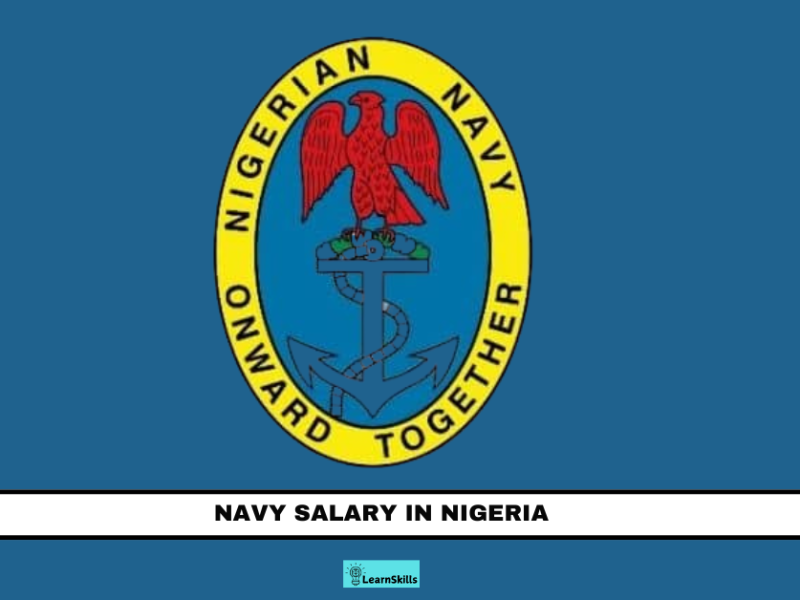If you’ve ever wondered what it’s like to serve in the Nigerian Navy, you might be curious about the financial aspect of this career.
Navy officers enjoy different salaries depending on their rank. For example, a Lieutenant Commander makes around ₦230,652 monthly, while a Sub-Lieutenant earns about ₦150,625 monthly.
Additionally, officers receive various allowances, such as housing benefits, which can enhance their overall compensation and help them manage living costs effectively.
Overview of the Nigerian Navy
The Nigerian Navy plays a crucial role in maintaining the country’s security and maritime interests. Understanding its history, role, and structure gives insight into how it operates effectively.
History and Role
The Nigerian Navy was established in 1956. It began as a small force and has expanded significantly since then. It became a branch of the Nigerian Armed Forces, ensuring the protection of Nigeria’s waterways and coastal areas.
The Navy is responsible for various duties, including:
- Defending national waters
- Anti-piracy operations
- Humanitarian assistance
- Naval patrols to combat illegal fishing and smuggling
Over the years, it has participated in peacekeeping missions and has built partnerships with other nations for training and operations. Its primary objective is to safeguard Nigeria’s maritime environment.
Structure and Ranks
The Nigerian Navy has a structured hierarchy consisting of commissioned and non-commissioned officers. Each rank has specific responsibilities and rights.
Here are the main categories of ranks:
- Commissioned Officers: These include ranks like Midshipman, Sub-Lieutenant, and Captain.
- Non-Commissioned Officers: Ranks include Rating, Petty Officer, and Chief Petty Officer.
The ranks are:
| Rank | Type |
|---|---|
| Warrant Chief Petty Officer | Non-Commissioned Officer |
| Chief Petty Officer | Non-Commissioned Officer |
| Lieutenant | Commissioned Officer |
| Commander | Commissioned Officer |
This structure helps maintain order and discipline essential for effective operations within the Navy. Each officer’s salary is influenced by rank and service time, providing a clear path for advancement in your naval career.
Navy Salary Structure
The Nigerian Navy salary structure includes different ranks, each having its own pay scale. Understanding this structure is essential for anyone interested in a career within the Nigerian Navy.
Commissioned Officers
Commissioned officers in the Nigerian Navy hold significant responsibilities and receive higher salaries than other ranks.
- Captain: The monthly salary for this rank can range from ₦200,000 to ₦300,000.
- Commodore: This officer earns between ₦300,000 and ₦450,000 per month.
- Admiral: The highest ranks, such as Admiral, may receive salaries above ₦500,000 monthly, depending on seniority and experience.
These salaries reflect the importance of leadership in military operations and the extensive training required for these positions.
Senior Officers
Senior officers play a vital role in strategic planning and execution within the Navy. Their salaries are structured based on rank and responsibilities.
- Warrant Chief Petty Officer: About ₦120,853 per month.
- Chief Petty Officer: Earns approximately ₦90,825 monthly.
- Petty Officer: Receives around ₦80,000 monthly.
These senior ranks also have additional benefits, enhancing the overall compensation package.
Monthly Salary
Monthly salaries for the Navy vary widely depending on the officer’s rank and time in service. Here’s a summarized view of various positions:
| Rank | Monthly Salary (₦) |
|---|---|
| Captain | 200,000 – 300,000 |
| Commodore | 300,000 – 450,000 |
| Admiral | Above 500,000 |
| Warrant Chief Petty Officer | 120,853 |
| Chief Petty Officer | 90,825 |
| Petty Officer | 80,000 |
In addition to base salaries, officers also receive allowances, including housing and food benefits, making the total compensation more attractive.
Recruitment and Career Path
Joining the Nigerian Navy offers a structured path for those interested in a military career. Understanding the recruitment process, necessary qualifications, and opportunities for career advancement can help you make informed decisions.
Joining the Navy
To join the Nigerian Navy, you must undergo a recruitment process that starts with an application. This process typically includes filling out forms, passing an entrance exam, and participating in an interview.
You can apply directly for various roles, including officer and rating positions. Officer roles usually require you to attend a training academy, while ratings positions may demand less formal education.
The Navy often announces recruitment through official channels, including its website and national media.
Qualifications and Training
To qualify for officer roles, you generally need a bachelor’s degree. Depending on the position, specific fields of study such as engineering or maritime studies may be preferred.
A minimum of secondary school education may be sufficient. Additional skills, such as technical knowledge or physical fitness, can improve your chances.
After acceptance, you will undergo training at the Nigerian Naval College or other facilities. This training includes military, leadership, and specialized technical skills based on your assigned role.
Career Advancement
Career advancement in the Nigerian Navy depends on your performance, time in service, and available openings. You start as a junior officer or rating and can advance to higher ranks like Lieutenant, Commander, or Commodore.
Promotions are awarded based on evaluations and examinations. Continued education and specialized training can also enhance your chances for advancement.
As you progress, you may get opportunities for leadership roles, administrative positions, or specialized missions that can shape your career within the Navy. This structured approach allows you to grow professionally while serving your country.
Roles and Specializations
Various roles and specializations exist to meet the diverse needs of naval operations. Each job is crucial in maintaining national security and ensuring effective maritime operations.
Specialized Navy Jobs
Within the Nigerian Navy, specialized jobs are vital for operational efficiency. These roles include:
- Combat Operations: Focus on direct engagement in warfare and maritime security.
- Engineering: Responsible for the maintenance and repair of naval vessels and equipment.
- Logistics: Ensures the smooth supply chain management for naval operations.
- Intelligence: Conducts surveillance and gathers information critical for decision-making.
These specializations require unique skill sets and training, impacting your career advancement and salary within the Navy.
The Hydrographer of the Nigerian Navy
The Hydrographer plays a key role in naval operations. This position focuses on the study and mapping of marine environments.
Responsibilities include:
- Conducting Hydrographic Surveys: Gathering data on water depths and seafloor topography.
- Creating Nautical Charts: Producing accurate charts to aid navigation for naval and commercial vessels.
- Advising on Maritime Safety: Providing information to improve safety measures in marine operations.
The Hydrographer’s work is essential for effective navigation and ensuring safe passage through Nigerian waters, showcasing the importance of this role in national security.
National Security Contributions
The Nigerian Navy plays a vital role in maintaining national security. Their efforts focus on counter-terrorism and preventing economic crimes, both crucial for a stable society.
Counter-Terrorism
Terrorism poses a significant threat to Nigeria’s national security. The Nigerian Navy actively participates in counter-terrorism operations.
Key Responsibilities:
- Maritime Patrols: Regular patrols help monitor coastal areas for suspicious activities.
- Collaborative Efforts: The Navy works with the Department of State Services (DSS) and other agencies to share intelligence and strategize responses.
- Rescue Missions: They rescue hostages and respond to terrorist threats at sea.
These actions are essential in disrupting terrorist groups operations and protecting citizens. The Navy’s proactive measures significantly reduce the risks posed by these threats.
Economic Crimes Prevention
Economic crimes, including smuggling and trafficking, undermine national stability. The Navy is crucial in safeguarding Nigeria’s economic interests.
Key Measures:
- Surveillance and Interdiction: The Navy conducts surveillance missions to detect illegal activities.
- Engagement with Agencies: Coordination with customs and the DSS enhances the effectiveness of enforcement operations.
- Deterrent Force: Their presence at sea is a deterrent to potential smugglers and traffickers.
Through these efforts, the Navy mitigates economic risks and preserves the integrity of national resources. Their role is central to combating various forms of economic crime.
Benefits and Compensation
If you join the Nigerian Navy, you can expect various benefits and a structured salary. These ensure that you are supported both financially and personally.
Salary Structure
Base Salaries:
- Acting Sub-Lieutenant: ₦130,852 per month
- Mid-Shipman: ₦118,835 per month
- Warrant Chief Petty Officer: ₦300,000 to ₦400,000 per month
Non-Commissioned Officers:
- Chief Petty Officer: ₦229,000 per month
Additional Benefits
Navy personnel receive allowances that can significantly boost earnings. Key benefits include:
- Housing Allowance: Support for accommodation needs.
- Medical Benefits: Access to healthcare services for you and your family.
- Transportation Allowance: Assistance with travel costs related to duty.
- Training Opportunities: Programs to enhance skills and career growth.










